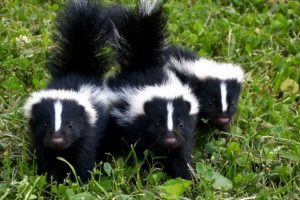
Love is in the air. And it smells like skunk.
All over the South in the past few weeks male skunks have been on the prowl, like real-life versions of lovelorn cartoon character Pepé Le Pew.
“It is their mating season,” Brian Flock, an appropriately-named biologist with the Tennessee Wildlife Resources Agency, said. “They are maybe a little more active with the warmer weather, but this time of year the males are out moving around, spraying, searching for a mate.”
Skunk mating season, a phrase that borders on oxymoronic, begins in the South in late January or early February each year and lasts until about March.
Many species of small mammals start looking for love this time of year, but skunks start earlier than most, Flock said.
It is certainly not because their smell makes love harder to find; the opposite. Their oil-based scent glands are an asset in the mating game.
“The males actually spray to attract females,” Drew Gillilard, a technician for Nashville-area animal control company Trapper Jack, said. “They mark territory for females to find them. That is why you do not want one near your pet or under your house this time of year.”
With all the skunks getting busy, Gillilard has too.
“We are seeing an awful lot of them, and getting tons of calls,” he said. “It happens this time every year. Basically it is 9 times out of 10, one or a couple getting under AC units and houses, but obviously you see them on the road a lot too.”
In fact, Gillilard was on the road from one skunk call to another when he spoke to us Tuesday morning.
“I’ve got two in the back right now.”
They were, shall we say, on their way to a better place. Because they are notorious rabies vectors, the TWRA mandates that skunks be euthanized upon capture.
“We try to do it as humanely as possible when we do,” Gillilard said.
A number of drivers are doing the same thing by accident.
“We are seeing a lot of those poor things being squashed,” Jolita Nemeth, with Williamson County Animal Control, said.
She suggested that the large number of skunks seen might be about more than mating season and warmer weather.

“It is their mating season, but really with so many of these developments there is no place left for any of these little critters to go,” she said.
Mating season, warm weather, habitat destruction . . .
“The easy answer is mating, but many factors go into it,” Flock said.
As for dealing with getting sprayed, there are many answers but only one solution.
“The spray is an oil, and it seeps into every porous surface and especially gets into the skin,” he said. “If it happens in an office or inside, it goes everywhere. You may even need to replace the insulation in the walls, or months later you will still smell it.”
Believe it or not, Gillilard claims to have never had the pleasure. They use enclosed traps, and stay safe from the stench.
But he said he has seen, or rather, smelled plenty of family pets caught up in the action.
He recommends a bath in a mix of tomato juice and dish soap.
Laura Kinnie, a vet tech at the Franklin Animal Health Center, said first of all, simply abstain from getting sprayed.
“But there are products out there,” she said. “We use one called skunk away, and it is just a bathing process that you do.”
She said home remedies, like tomato juice baths, may help. But the only real solution is time.
“Regardless of what you do, it just kind of has to wear off,” she said.
“Frequent bathing helps. But every time it rains, you will have the lovely skunk smell raise its ugly head.”
















